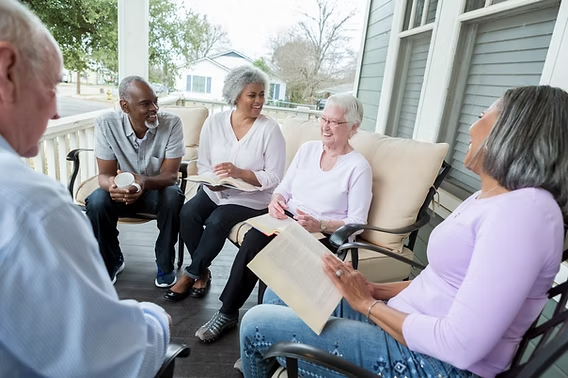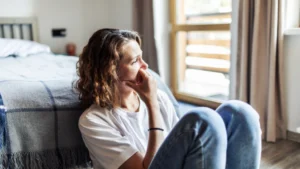As we get older, the people we hang out with may change. Things like retirement, changes in our health, or the death of a loved one can easily make us spend less time with other people. But taking care of our relationships isn’t just a nice thing to do; it’s one of the most important things we can do for our mental and emotional health.
Keeping up with friends and family is strongly linked to better health, happier moods, and even living longer. We are wired to connect with others, and as we get older, these connections become even more important.
Why staying social is good for your emotions
Emotional health is a very important part of living a good life. Being publicly engaged gives older people a feeling of purpose and connection. Whether it’s a chat with a neighbor, a weekly group exercise, or a phone call with family every week, these interactions help you feel better and lower your risk of sadness and loneliness.
Being socially active also makes you feel better about your own self-worth and makes you more optimistic about life. Seniors are more likely to speak up, stay positive, and feel respected when they feel linked to other people. Just knowing that someone is willing to listen can make a big difference in how you feel.
How being alone can hurt your physical and mental health
Being lonely isn’t just a mood; it can hurt your physical and mental health in real ways. Long-term loneliness in older people is linked to a higher chance of sadness, anxiety, memory loss, and even heart disease, according to studies.
When people feel alone, they may be less inclined to take care of their health, eat well, or stay active. This can feed into a loop of bad mental health and getting worse physical problems over time. That’s why having friends and family is not a luxury but an important part of staying healthy as you age.
Staying social is good for your brain
Regularly interacting with other people has been linked to better memory and brain function. Talking to people, telling stories, or playing games with a group keeps the brain busy and interested. Engaging in these activities helps you utilize your words, memory, and problem-solving skills, all of which are essential for maintaining a healthy brain.
Getting together with other people lowers stress hormones like cortisol, which can hurt the brain if not controlled. Seniors who have a lot of friends and family tend to lose their minds less quickly and are less likely to get dementia.
Creating chances for people to connect
It’s always possible to make new friends or grow an old one. It’s possible to make a big change with little work. Seniors can meet people who share their hobbies by volunteering, joining a club, going to religious events, or taking community classes. A lot of community centers have activities like exercise lessons, art projects, and talk groups just for older people.
Technology can be a helpful way for people who have trouble getting out to do so. Video talks, social networks, and online chat rooms let you connect with family and meet new people. Seniors can keep their minds and social lives active without leaving home by joining online book clubs, playing games, or taking classes.
What Family and Friends Do
Most of the time, family and close friends are the closest people who can help you right away. Spending quality time with people you care about makes your relationships stronger and your mental safety stronger. A simple check-in, a phone call, or a meal with someone can help an older person feel valued and attached.
Relationships between generations are also very strong. Spending time with grandkids, nieces, or kids from the neighborhood can make everyday life more fun, full of energy, and open your eyes to new things. These ties help bring people of different groups together and give them a stronger sense of purpose.
Keeping your independence by doing social things
Many older people stay busy and independent by keeping up with their friends and family. Having something to look forward to makes you move, organize yourself, and take the lead, whether you’re going to a nearby café, getting ready for a club meeting, or planning a social event.
Seniors may be more likely to become inactive or forget to do important daily tasks when they are alone. Making plans with other people, even if they’re just for a drink, gives your day order and keeps you moving and thinking.
Helping People Be Emotionally Strong
As we age, our lives will always be different. Losing a partner, having health problems, or moving to a new place can be hard on the emotions. People can handle these changes better when they have a strong network of friends and family who can ease, understand, and reassure them.
Seniors can handle life’s ups and downs better when they are with caring people. Having someone you can talk to about your feelings can help you deal with sadness or stress and give you the strength to keep going.
Getting to know new people
Making new links can be scary at times, especially as you get older. But being willing to make new friends can lead to fun things. New relationships bring new energy and emotional warmth, whether they start with a hobby, a friendly chat with a neighbor, or a neighborhood group.
Friendships bring people together, make them laugh, and help them understand each other. Making genuine connections with others is a never-ending process. They tell us that we are not alone.
Getting older with joy and connection
Being social isn’t just a fun thing to do; it’s an important part of living a healthy, happy old age. Having strong social ties is good for your health, your mental clarity, your emotional stability, and your overall happiness. Keeping in touch with family, friends, neighbors, and technology can help older people live longer, better, and more connected lives.
As you get older, connect with other people every day, just like you should eat well and work out. You get benefits in every area of your life, and you share those benefits with everyone you meet along the way.




